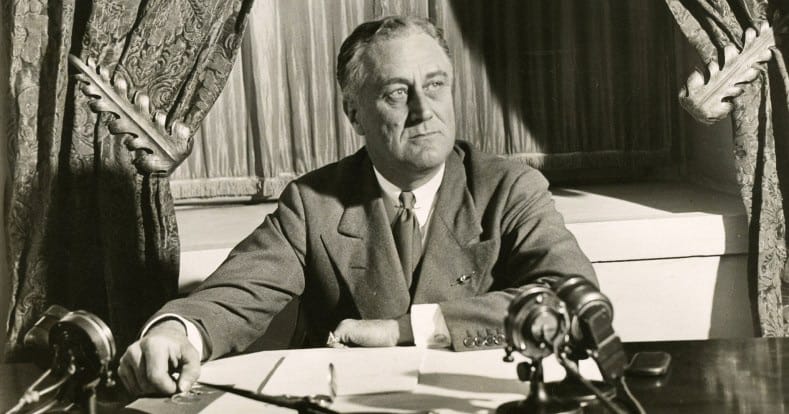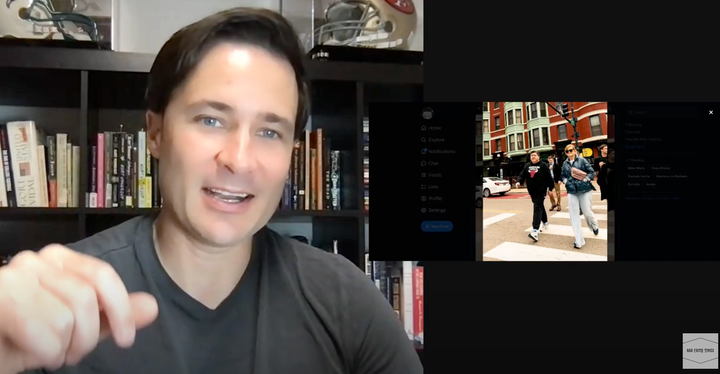Curtis Yarvin's Slick Bad-Faith Trick
The American right needs Frank Roosevelt to have been a merciless tyrant.

Curtis Yarvin, the smug, leather jacket-wearing pseudo-intellectual with oh-so-carefully tousled hair who has the ear of the most powerful men in the world, knows exactly what he’s doing when he says Franklin Delano Roosevelt was an authoritarian tyrant.
Yarvin, the technofascist whisperer who has worked tirelessly to convince Silicon Valley leaders that democracy is a failed system, was profiled in The New York Times last week and offered his usual attacks on our democratic republic, which has survived for 250 years despite the Yarvins who pop up every now and again and declare an end to self governance – this time with the sheen of a rebel raging against cultural liberal norms.
Thanks to all those who support Bad Faith Times. Consider subscribing for $3 or $5 a month, or leaving a tip!
I encourage you to read the Yarvin interview if you, like me, want to understand the mindset of the enemies of American democracy, not just JD Vance and his ilk, but Mark Zuckerberg and Jeff Bezos and Elon Musk, the industrial titans who decided this summer, shortly after a would-be assassin tried to shoot Donald Trump, that democracy was indeed over.
There was one part of the NYT interview that highlighted Yarvin’s expert deployment of bad faith to make his arguments and philosophy seem legitimate and a valid part of the national discourse. Among Yarvin’s slickest bad-faith tricks is to portray Roosevelt as an anti-democratic strongman who stormed into power during a national crisis and told members of Congress that he would ignore them and wield power how he saw fit in the coming years. In Yarvin’s telling, FDR was an erudite version of Trump – one who had done things like read books – seizing the presidency and promising vengeance for anyone who stood in his way to make America great again (make sure working people had a little food to eat).
"You’ve probably heard of a man named Franklin Delano Roosevelt," Yarvin told the Times in one of the smarmiest quotes in human history. "I do a speech sometimes where I’ll just read the last 10 paragraphs of F.D.R.’s first Inaugural Address, in which he essentially says, hey, Congress, give me absolute power, or I’ll take it anyway. So did F.D.R. actually take that level of power? Yeah, he did."

You can read FDR’s first inaugural address if you’d like to see what he actually told Congress (the address includes some beautiful and inspirational flourishes like this: "The money changers have fled from their high seats in the temple of our civilization. We may now restore that temple to the ancient truths. The measure of the restoration lies in the extent to which we apply social values more noble than mere monetary profit").
When the unabashedly pro-monarchy Yarvin says “essentially,” what he means is this: FDR encouraged immediate and vigorous action to save the country from the horrors of the Great Depression, and suggested he would be aggressive in pushing vital economic reforms through Congress and ensuring they didn’t get struck down in the courts, or – in case his opponents in Congress gummed up the process – he would ask for emergency powers. Roosevelt said he "shall not evade the clear course of duty that will then confront me. I shall ask the Congress for the one remaining instrument to meet the crisis – broad executive power to wage a war against the emergency, as great as the power that would be given to me if we were in fact invaded by a foreign foe." You'll notice the part about asking the legislative branch for such sweeping authority, not to torment migrants at the southern border but to stop the country's catastrophic economic free fall. No tyrant asks for anything. They demand.
For Yarvin’s anti-democracy arguments to work – for them to have some precedence in U.S. history – Roosevelt had to be an authoritarian bent on domination and buying into what would one day be called the unitary executive theory – a favorite among anti-constitutionalist right wingers during George W. Bush’s presidency and, naturally, during Trump’s reign.
In no way could Roosevelt have been considered an opponent of democratic republicanism. Again and again in his run for the White House and during his 12 years in power, Roosevelt encouraged popular actions that would leave lawmakers little choice but to act in the interest of the working families who had for so long borne the brunt of the nation’s economic collapse. Under unspeakable internal and external pressure to become an American dictator as democracy faded from the international stage in the early part of the 20th century, FDR time and again said no. He rejected the cowardly retreat of those who were ready to give up on the American experiment and go the way of Russia and Germany and Italy and other nations that had turned to authoritarian terror as a solution to their myriad and intractable problems.
FDR, in this way, was democracy’s greatest friend. A weaker man would have folded to the anti-democracy forces pleading with Roosevelt to declare an end to self governance. A weaker man – someone like Yarvin, perhaps – would have given in to the country’s most evil impulses in a time of economic emergency. For Yarvin and those who follow his dumbass writing to portray FDR as a tyrant is an insult to Roosevelt’s legacy as the savior of American small-d democratic self rule.
"We do not distrust the future of essential democracy. The people of the United States have not failed," Roosevelt said in his first inaugural address. "In their need they have registered a mandate that they want direct, vigorous action. They have asked for discipline and direction under leadership. They have made me the present instrument of their wishes. In the spirit of the gift I take it."
Political bad faith seeks to alter narratives and history in service of a favored political goal. That’s precisely what Yarvin is doing when he cites FDR as a precedent for a strongman who can get things done by himself, with no input from the judicial or legislative branches, with no say from the unbathed hoards (working people) for whom Yarvin holds such clear disdain.
Curtis Yarvin and his acolytes know Franklin Roosevelt was not an authoritarian. But he needs FDR to have been a merciless strongman who had no time for the work of democracy if Yarvin and his followers are to legitimize the American right’s rejection of democratic norms and its full embrace of fascist thought.
The faith is bad and thanks to guys like Yarvin, it’s getting worse.
Follow Denny Carter on Bluesky at @dennycarter.bsky.social.




Comments ()